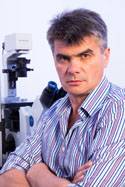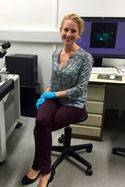Mitochondria, reactive oxygen species and calcium signal in physiology and pathology of neurons and astrocytes.
Professor Andrey Y. Abramov is biophysicist and cell physiologist.
Researcher ID: |  |

Professor Andrey Abramov obtained a PhD in biophysics in Tashkent State University (Uzbekistan). He joined the laboratory of Professor Michael Duchen at the Department of Physiology, UCL for postdoctoral training. Interaction of the calcium signalling, reactive oxygen species (ROS) and mitochondria have been a major research interest from the PhD projects and have been intensively developed in postdoctoral studies. After obtaining the Parkinson’s UK Senior Research Fellowship in 2008 established laboratory at the Department of Molecular Neuroscience UCL Institute of Neurology.
Research
Our research is focused in several directions.
- One of the main directions is investigation of the cellular mechanisms of neurodegeneration in Parkinson’s disease, Alzheimer’s disease and ALS and the role of mitochondria, ROS and calcium in these processes. Brain consumes more oxygen and glucose than any other tissue to meet high energy demand. Considering this it is not surprise that any changes in energy production (mitochondrial dysfunction) or activation of energy consuming processes (including calcium signalling) in combination with high level of ROS are specifically vulnerable for brain cells.
- Interaction of mitochondria, reactive oxygen species and calcium signalling in physiology. Production of ROS in cellular enzymes and mitochondria can be regulated by multiple factors. Recently we identified the role of ROS in oxygen sensing, signal transduction and lipid metabolism. Importantly, alteration of this well balanced mechanism can lead to oxidative damage and neurodegeneration.
- Of special interest of the laboratory is the unravelling of the role of the fossil molecule - inorganic polyphosphate in higher organisms. Identification of the role of polyphosphate in signal transduction and mitochondrial bioenergetics made a basis for finding the possible missing link in the understanding of the number of pathologies.
Selected publications
1. Gandhi S, Wood-Kaczmar A, Yao Z, Plun-Favreau H, Deas E, Klupsch K, Downward J, Latchman DS, Tabrizi SJ, Wood NW, Duchen MR, Abramov AY. PINK1 associated Parkinson’s disease is caused by neuronal vulnerability to calcium induced cell death. Molecular Cell. 2009 March13;33(5):627-38
2. Kostic M, Ludtmann MH, Bading H, Hershfinkel M, Steer E, Chu CT, Abramov AY, Sekler I. PKA Phosphorylation of NCLX Reverses Mitochondrial Calcium Overload and Depolarization, Promoting Survival of PINK1-Deficient Dopaminergic Neurons. Cell Rep. 2015 Sep 29. pii: S2211-1247(15)00992-4.
3. Bartolome F, Wu HC, Burchell VS, Preza E, Wray S, Mahoney CJ, Fox NC, Calvo A, Canosa A, Moglia C, Mandrioli J, Chiò A, Orrell RW, Houlden H, Hardy J, Abramov AY*, Plun-Favreau H. Pathogenic VCP mutations induce mitochondrial uncoupling and reduced ATP levels. Neuron. 2013 Apr 10;78(1):57-64. *Joint senior and corresponding author
4. Cremades N, Cohen SIA, Deas E, Abramov AY, Chen AY,Orte A, Sandal M, Clarke RW, Dunne P, Aprile FA, Bertoncini CW, Wood NW, Knowles TPJ, Dobson CM, Klenerman D. Direct Observation of the Interconversion of Normal and Toxic Forms of a-Synuclein. Cell 2012 25;149(5):1048-59.
5. Deas E, Cremades N, Angelova PR, Ludtmann MH, Yao Z, Chen S, Horrocks MH, Banushi B, Little D, Devine MJ, Gissen P, Klenerman D, Dobson CM, Wood NW, Gandhi S, Abramov AY. Alpha-Synuclein Oligomers Interact with Metal Ions to Induce Oxidative Stress and Neuronal Death in Parkinson's Disease. Antioxid Redox Signal. 2016 Mar 1;24(7):376-91
6. Angelova PR, Ludtmann MH, Horrocks MH, Negoda A, Cremades N, Klenerman D, Dobson CM, Wood NW, Pavlov EV, Gandhi S, Abramov AY. Ca2+ is a key factor in α-synuclein-induced neurotoxicity. J Cell Sci. 2016 May 1;129(9):1792-801.
7. Ludtmann MHR, Angelova PR, Gandhi S, Ninkina NN, Buchman VL, Abramov AY. Monomeric alpha-synuclein exerts a physiological role in brain ATP synthase. J Neurosci. 2016 Oct 12;36(41):10510-10521
8. Vaarmann A, Gandhi S, Abramov AY. Dopamine induces Ca2+ signalling in astrocytes through reactive oxygen species generated by monoamine oxidase. J Biol Chem. 2010 Aug 6;285(32):25018-23.
9. Domijan AM, Kovac S, Abramov AY. Lipid peroxidation is essential for phospholipase C activity and the inositol-trisphosphate-related Ca²⁺ signal. J Cell Sci. 2014 Jan 1;127(Pt 1):21-6.
10. Angelova PR, Kasymov V, Christie I, Sheikhbahaei S, Turovsky E, Marina N, Korsak A, Zwicker J, Teschemacher AG, Ackland GL, Funk GD, Kasparov S, Abramov AY, Gourine AV. Functional Oxygen Sensitivity of Astrocytes. J Neurosci. 2015 Jul 22;35(29):10460-73.
11. Pavlov E, Aschar-Sobbi R, Campanella M, Turner RJ, Gómez-García MR, Abramov AY. Inorganic polyphosphate and energy metabolism in mammalian cells. J Biol Chem. 2010 Mar 26;285(13):9420-8.
12. Holmström KM, Marina N, Baev AY, Wood NW, Gourine AV, Abramov AY. Signalling properties of inorganic polyphosphate in the mammalian brain. Nat Commun. 2013 Jan 15;4:1362.
13. Holmström KM, Baird L, Zhang Y, Hargreaves I, Chalasani A, Land JM, Stanyer L, Yamamoto M, Dinkova-Kostova AT, Abramov AY. Nrf2 impacts cellular bioenergetics by controlling substrate availability for mitochondrial respiration. Biol Open. 2013 Jun 20;2(8):761-70.
14. Berezhnov AV, Soutar MP, Fedotova EI, Frolova MS, Plun-Favreau H, Zinchenko VP, Abramov AY. Intracellular pH Modulates Autophagy and Mitophagy. J Biol Chem. 2016 Apr 15;291(16):8701-8.
15. Delgado-Camprubi M, Esteras N, Soutar MP, Plun-Favreau H, Abramov AY. Deficiency of Parkinson's disease-related gene Fbxo7 is associated with impaired mitochondrial metabolism by PARP activation. Cell Death Differ. 2017 Jan;24(1):120-131.
Members of Laboratory
Senior Research Fellow

Dr Plamena Stroh (Angelova) obtained her BSc in Molecular Biology and MSc in Biophysics and radiobiology, both from Sofia University, Bulgaria. She completed her PhD in Experimental Biophysics from Humboldt University Berlin in 2007, studying the oxidative modulation of potassium currents in the hippocampus. She continued to work on the role potassium currents in epilepsy in Uwe Heinemann’s Lab at Johannes-Mueller Institut für Physiologie, at Charité Berlin. Prior to joining ION UCL, she completed a PostDoc at Technical University Munich (MRI-Neuro-Kopf-Zentrum, Experimental Neurosurgery group) working on in-vivo imaging of neurovascular coupling.
She is currently Senior Research Associate at Abramov’s Lab, where she studies the mechanisms underlying the neuronal loss in neurodegenerative diseases in terms of the function of misfolded proteins (alpha-synuclein and beta-amyloid), altered cellular signaling, mitochondrial dysfunction and oxidative stress. As well, she is further interested in fundamental questions of neuroscience and bioenergetics like hypoxia sensing, ROS signalling and unravelling the function of phylogenetically ancient molecule-inorganic polyphosphate.
Postdoctoral Research Associates:

Dr Marthe Ludtmann - I obtained my PhD in Biological Sciences from Royal Holloway University London in 2012 before I joined the Abramov group at the Institute of Neurology.
I am working on a range of projects to assess altered cellular processes in Parkinson’s disease and other neurodegenerative diseases. I use live cell imaging techniques to assess calcium homeostasis, superoxide production and mitochondrial physiology.

Dr Noemi Esteras Gallego - During my PhD, obtained from Complutense University of Madrid, I studied the role of the alterations in cell cycle regulation in the pathogenesis of Alzheimer’s disease. I joined the Department of Molecular Neuroscience in 2014 and my current research focuses on studying the cellular and molecular basis of mitochondrial dysfunction in neurodegenerative disorders, paying special attention to tau-related pathology. I work with different cellular models, including iPSC-derived neurons and fibroblasts from patients, and primary neuronal-astrocytic co-cultures. I am also interested in the role of Nrf2 pathway, one of the most important antioxidant systems in the body, highlighting its relationship with bioenergetics, metabolism and mitochondria.
Visiting Research Associate

Miss Marta Maiolino - I graduated with honours from the University of Calabria (Italy) with a master’s degree in Chemistry and Pharmaceutical Techniques in September 2013. My research experience dates back to January 2010, when I joined the laboratory of Prof. Marcello Maggiolini (Dept. of Pharmacy, Health and Nutritional Sciences, University of Calabria, Italy) and developed a strong expertise in cellular and molecular biology techniques studying molecular mechanisms involved in estrogenic signaling in breast cancer. In November 2014, I obtained a Phd position in the laboratory of Prof. Salvatore Amoroso (Dept. Of Biomedical Sciences, Marche Polytechinic University, Ancona) and studied molecular pharmacology of the Na+/Ca2+ exchanger in neuronal and cardiac models of ischemia/reperfusion injury (I/R).
Then, in June 2016, I moved to London to join the laboratory of Prof Andrey Abramov) studying the role of inorganic polyphosphate in physiological and pathophysiological response to glutamate in mammalian neurons.
 Close
Close

